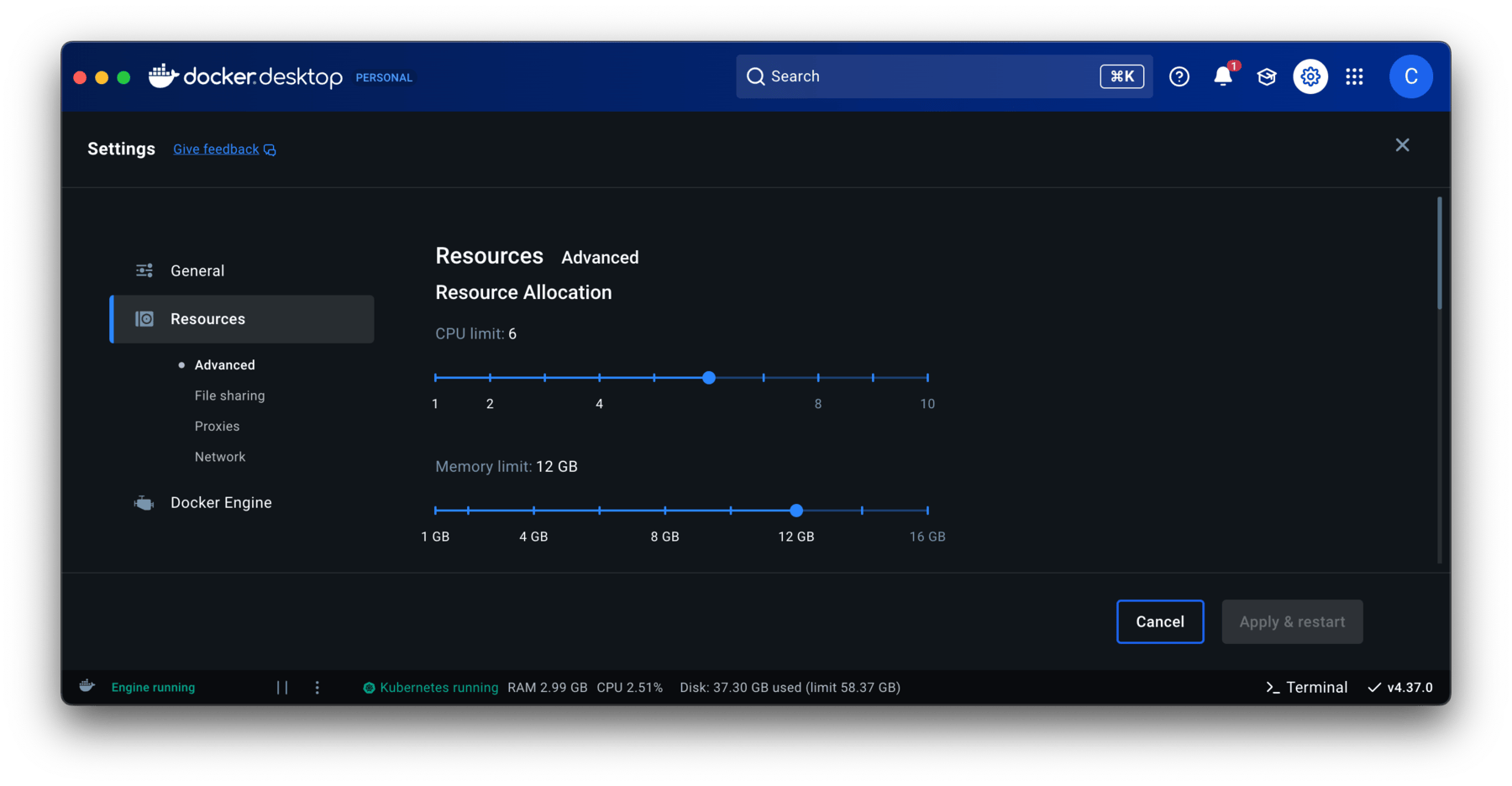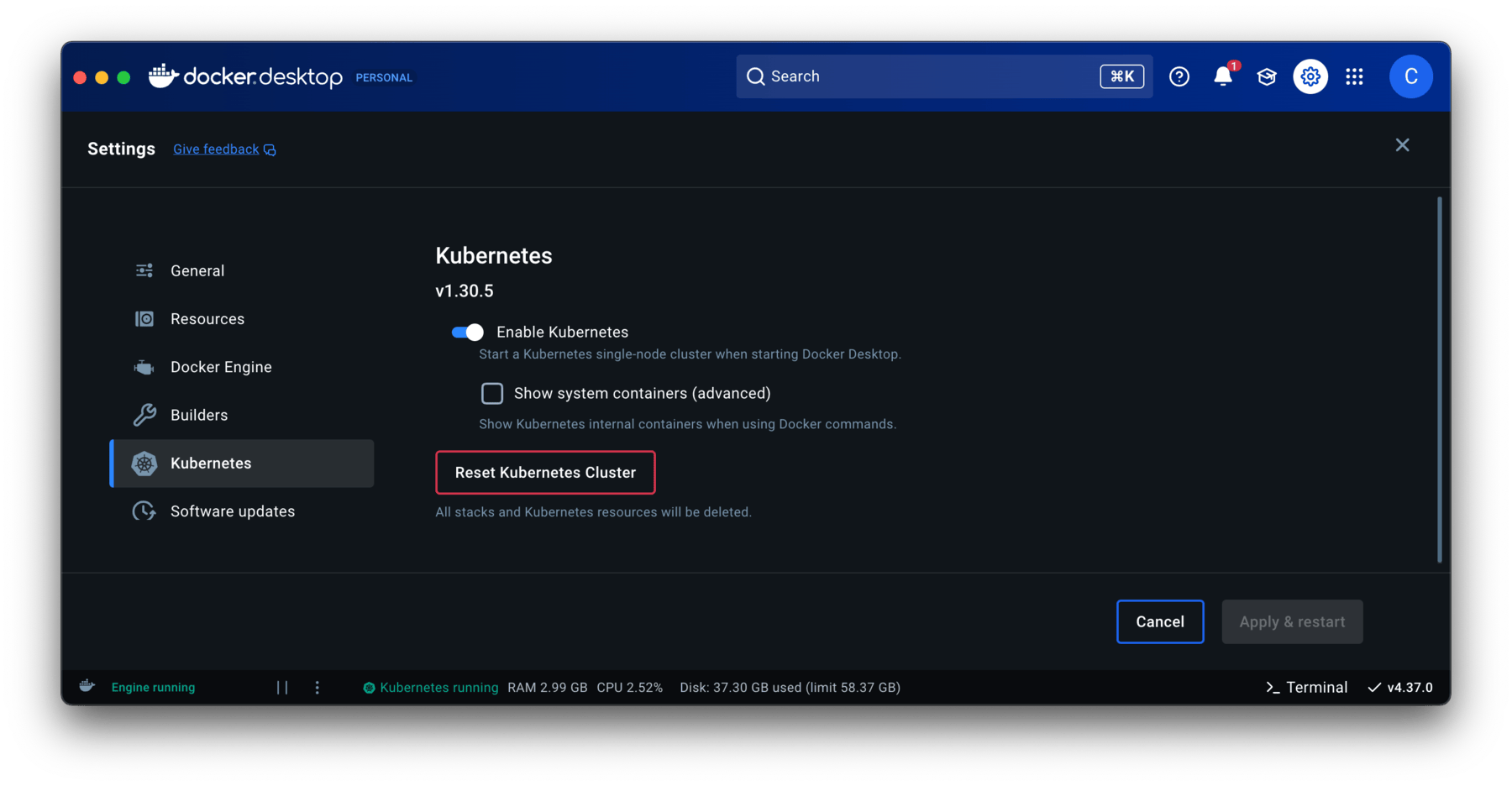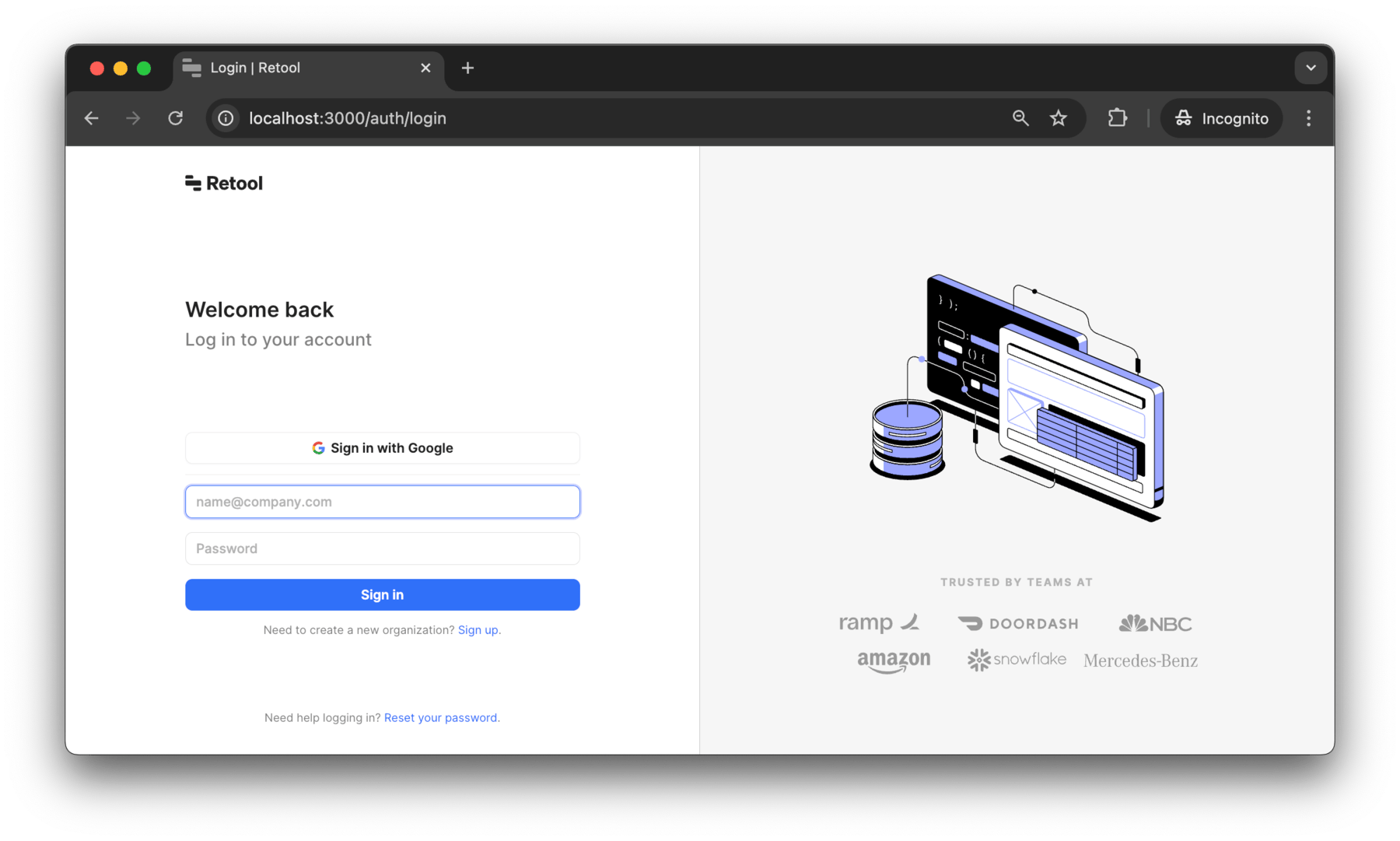Docker Kubernetes Manifest Installation
Retool does not recommend deploying to physical machines for team development and deployments. Consider deploying to managed Kubernetes services such as Amazon EKS, Azure Kubernetes Service, or Google Kubernetes Engine.
The following example focuses on using Kubernetes on Docker Desktop for education purposes.
Requirements
To deploy Retool using Docker, you need:
- A Retool license key, which you can obtain from my.retool.com or your Retool account manager.
- A working installation of Docker desktop.
- Kubernetes enabled on Docker Desktop.
- Computer with 16 GB of RAM.
Self-hosted deployments also require the following and are configured within Docker Desktop Settings/Resources:
- OS Supported by Docker Desktop configured with:
- 12GiB memory
- 6 vCPUs
- 60GiB storage.
To confirm you have sufficient resources, open up Docker Desktop and go to Settings > Resources. This console will allow you to set the values it can access.

In addition confirm that you have Kubernetes enabled by going to Settings > Kubernetes.

This example uses a Mac M1 Pro processor, 16 GB of RAM with Docker Desktop for Mac version 4.37.0 with Kubernetes version 1.30.5.
Confirm Setup
Once you have performed the previous steps, please confirm that Docker Desktop Kubernetes is enabled. Execute the following command:
kubectl get nodes
The response should be something similar to:
NAME STATUS ROLES AGE VERSION
docker-desktop Ready control-plane 22d v1.30.5
If this doesn't return something similar you may be pointing at another Kubernetes installation. Execute the following command to see what context you are using:
kubectl config get-contexts
This should show docker-desktop selected with a star symbol. If it doesn't you can redirect your context by using the following command:
kubectl config use-context docker-desktop
Steps
- Run the following command to download the installation and Kubernetes manifests.
curl -L -O https://github.com/tryretool/retool-onpremise/archive/master.zip && unzip master.zip
cd retool-onpremise-master/kubernetes
- Once the command is run, the directory should have the following contents:
% ls -la
total 56
drwxr-xr-x 9 user staff 288 Dec 3 15:48 .
drwxr-xr-x 21 user staff 672 Dec 3 15:48 ..
-rw-r--r-- 1 user staff 1586 Dec 3 15:48 retool-code-executor-container.yaml
-rw-r--r-- 1 user staff 2811 Dec 3 15:48 retool-container.yaml
-rw-r--r-- 1 user staff 2062 Dec 3 15:48 retool-jobs-runner.yaml
-rw-r--r-- 1 user staff 1429 Dec 3 15:48 retool-postgres.yaml
-rw-r--r-- 1 user staff 546 Dec 3 15:48 retool-secrets.template.yaml
-rw-r--r-- 1 user staff 2523 Dec 3 15:48 retool-workflows-backend-container.yaml
-rw-r--r-- 1 user staff 2587 Dec 3 15:48 retool-workflows-worker-container.yaml
Secret Updates
- Copy the retool-secrets.template.yaml to retool-secrets.yaml.
cp retool-secrets.template.yaml retool-secrets.yaml
- Edit retool-secrets.yaml to enter in the Retool license key. Opening the yaml document will appear as follows:
apiVersion: v1
kind: Secret
metadata:
name: retoolsecrets
type: Opaque
data:
jwt_secret: {{ random base64 encoded string to sign jwt tokens }}
encryption_key: {{ random base64 encoded string to encrypt database credentials }}
postgres_password: {{ random base64 encoded string to set as the internal retool db password }}
license_key: {{ base64 encoded string of the license key Retool will provide you }}
google_client_id: {{ google client id encoded in base64 }}
google_client_secret: {{ google client secret encoded in base64 }}
- Use the following commands to generate random unique base64 entries for jwt_secret, encryption_key.
openssl rand -base64 16 //take result and put into jwt_secret line
openssl rand -base64 16 //take result and put into encryption_key line
- Take the Retool license key and use the following command to generate a base64 encoded string:
echo -n "ENTER RETOOL LICENSE KEY HERE" | openssl base64
- Create base64 encoded value for the Postgres DB Password, use the following command:
echo -n "ENTER POSTGRES PASSWORD HERE" | openssl base64
NOTE: The following values are not required for this POC, just place random text here and update the retool-secrets.yaml. These entries are examined on startup by the jobs-runner and api pods as part of their environment settings.
- Create base64 encoded value for the Google Client ID, use the following command:
echo -n "Google Client ID HERE" | openssl base64
- Create base64 encoded value for the Google Client Secret, use the following command:
echo -n "Google Client Secret HERE" | openssl base64
Image updates to Stable or Edge Release
- Edit the retool-jobs-runner.yaml and retool-container.yaml to have an image id specified. Determine the release you wish to use for functionality. For example we will use the Stable 3.114 release available at Docker Hub:
image: tryretool/backend:3.75.17-stable
Retool recommends that Stable release be used for production deployments only.
Resource Limit updates
It is important that you are aware that the manifests have CPU/Memory limits defined and this could cause OOMKilled (Out of Memory) errors when deploying on a local laptop in their default settings. For this example, we need to reduce the default memory limits in the manifests (YAML files) by adjusting the resources sections:
resources:
limits:
cpu: 2
memory: 2Gi
requests:
cpu: 1
memory: 1Gi
Here is a recommended list of resource limits for this example that has been tested:
| manifest | resources limits |
|---|---|
| retool-code-executor-container.yaml | limits / cpu & memory = 2/2Gi, requests / cpu & memory 1/1Gi |
| retool-container.yaml | limits / cpu & memory = 1/5Gi, requests / cpu & memory = 1/1Gi |
| retool-jobs-runner.yaml | limits / cpu & memory = 2/2Gi, requests / cpu & memory 1/1Gi |
| retool-workflows-backend-container.yaml | limits / cpu & memory = 2/2Gi, requests / cpu & memory 1/1Gi |
| retool-workflows-worker-container.yaml | limits / cpu & memory = 2/2Gi, requests / cpu & memory 1/1Gi |
Retool Secrets
- Deploy the secrets manifest using the following command:
kubectl apply -f retool-secrets.yaml
- This returns:
secret/retoolsecrets created
- Check to make the sure the secrets were applied using the following command:
kubectl get secrets
- This returns:
NAME TYPE DATA AGE
retoolsecrets Opaque 4 32s
postgres Pod
- Deploy the postgres manifest using the following command:
kubectl apply -f retool-postgres.yaml
- This returns:
persistentvolumeclaim/postgres-pvc created
deployment.apps/postgres created
service/postgres configured
- Check to make sure the postgres deployment / pod have successfully deployed using the following command:
kubectl get pods
- This returns:
NAME READY STATUS RESTARTS AGE
postgres-69898447dd-9zs2v 1/1 Running 0 31s
- Also check the logs to make sure that the postgres pod is accepting connections.
kubectl logs <postgres pod name>
- This returns:
The files belonging to this database system will be owned by user "postgres".
This user must also own the server process.
The database cluster will be initialized with locale "en_US.utf8".
The default database encoding has accordingly been set to "UTF8".
The default text search configuration will be set to "english".
...
2024-12-19 20:47:27.117 UTC [1] LOG: database system is ready to accept connections
jobs-runner Pod
- Deploy the jobs-runner manifest using the following command:
kubectl apply -f retool-jobs-runner.yaml
- This returns:
deployment.apps/jobs-runner created
- Check to make sure the jobs-runner deployment / pod have successfully deployed using the following command:
kubectl get pods
- This returns:
NAME READY STATUS RESTARTS AGE
jobs-runner-6fd55db6dc-dr989 1/1 Running 0 17s
postgres-775c447bdc-l97sg 1/1 Running 0 5m4s
- Also check the logs to make sure that the jobs-runner pod is executing migrations.
kubectl logs <jobs-runner pod name>
- This returns:
wait-for-it.sh: waiting for postgres:5432 without a timeout
wait-for-it.sh: postgres:5432 is available after 0 seconds
not untarring the bundle
sed: can't read ./dist/mobile/*.js: No such file or directory
{"level":"info","message":"[process service types] JOBS_RUNNER","timestamp":"2024-12-19T20:52:17.345Z"}
Acquiring lock to run migrations...
Acquired lock
Running database migrations...
...
{"level":"info","message":"Jobs runner checking for changes.","pid":17,"source":"JOBS_RUNNER","timestamp":"2024-12-19T20:52:54.809Z"}
{"level":"info","message":"No organizations found, sleeping...","pid":17,"source":"SOURCE_CONTROL_DEPLOYMENT","timestamp":"2024-12-19T20:52:54.820Z"}
code-executor Pod
- Deploy the code-executor manifest using the following command:
kubectl apply -f retool-code-executor-container.yaml
- This returns:
deployment.apps/code-executor created
service/code-executor created
- Check to make sure the jobs-runner deployment / pod have successfully deployed using the following command:
kubectl get pods
- This returns:
NAME READY STATUS RESTARTS AGE
code-executor-d576d4d6-44tlv 1/1 Running 0 54s
jobs-runner-6fd55db6dc-dr989 1/1 Running 0 3m25s
postgres-775c447bdc-l97sg 1/1 Running 0 8m12s
- Also check the logs to make sure that the code-executor pod is running.
kubectl logs <code-executor pod name>
- This returns:
Running code executor container in privileged mode.
iptables: Disallowing link-local addresses
{"level":"info","message":"Not configuring StatsD...","timestamp":"2025-01-09T13:07:52.358Z"}
{"level":"info","message":"Installing request logging middleware...","timestamp":"2025-01-09T13:07:52.378Z"}
{"level":"info","message":"Checking if nsjail can be used","timestamp":"2025-01-09T13:07:52.382Z"}
{"level":"info","message":"Populating environment cache","timestamp":"2025-01-09T13:07:52.386Z"}
...
api Pod
- Deploy the container manifest using the following command:
kubectl apply -f retool-container.yaml
- This returns:
deployment.apps/api created
service/api unchanged
persistentvolumeclaim/retool-pvc created
- Check to make sure the api deployment / pod have successfully deployed using the following command:
kubectl get pods
- This returns:
NAME READY STATUS RESTARTS AGE
api-f4cd96689-7r8qj 1/1 Running 0 21s
code-executor-d576d4d6-44tlv 1/1 Running 0 5m14s
jobs-runner-6fd55db6dc-dr989 1/1 Running 0 7m45s
postgres-775c447bdc-l97sg 1/1 Running 0 12m
- Also check the logs to make sure that the api pod is receiving health checks with a HTTP 200 status code from K8S. It will take several minutes for the K8S health check to display.
kubectl logs <api pod name>
- This returns:
wait-for-it.sh: waiting for postgres:5432 without a timeout
wait-for-it.sh: postgres:5432 is available after 0 seconds
not untarring the bundle
sed: can't read ./dist/mobile/*.js: No such file or directory
{"level":"info","message":"[process service types] MAIN_BACKEND, DB_CONNECTOR, DB_SSH_CONNECTOR","timestamp":"2025-01-09T13:12:56.415Z"}
Database migrations are up to date.
{"level":"info","message":"Not configuring StatsD...","timestamp":"2025-01-09T13:13:02.014Z"}
{"level":"info","message":"Not configuring StatsD...","timestamp":"2025-01-09T13:13:02.017Z"}
{"level":"info","message":"Not configuring Sentry...","timestamp":"2025-01-09T13:13:02.054Z"}
{"level":"info","message":"Not configuring StatsD...","timestamp":"2025-01-09T13:13:02.055Z"}
{"level":"info","message":"Running node v18.18.2","timestamp":"2025-01-09T13:13:02.071Z"}
{"0":"--openssl-legacy-provider","1":"--no-experimental-fetch","level":"info","message":"ARGV:","timestamp":"2025-01-09T13:13:02.074Z"}
...
{"level":"info","message":"license check http response code: 200","timestamp":"2025-01-09T13:13:07.973Z"}
...
workflows-api Pod
- Deploy the retool-workflows-backend-container.yaml manifest using the following command:
kubectl apply -f retool-workflows-backend-container.yaml
This returns:
deployment.apps/workflows-api created
service/workflows-api created
- Check to make sure the workflows-api deployment / pod have successfully deployed using the following command:
kubectl get pods
This returns:
NAME READY STATUS RESTARTS AGE
api-f4cd96689-7r8qj 1/1 Running 0 5m16s
code-executor-d576d4d6-44tlv 1/1 Running 0 10m
jobs-runner-6fd55db6dc-dr989 1/1 Running 0 12m
postgres-775c447bdc-l97sg 1/1 Running 0 17m
workflows-api-5fd56cbb44-pn4lb 1/1 Running 0 40s
- Also check the logs to make sure that the workflows-api pod is running.
kubectl logs <workflows-api pod name>
- This returns:
wait-for-it.sh: waiting for postgres:5432 without a timeout
wait-for-it.sh: postgres:5432 is available after 0 seconds
not untarring the bundle
sed: can't read ./dist/mobile/*.js: No such file or directory
{"level":"info","message":"[process service types] MAIN_BACKEND, DB_CONNECTOR, DB_SSH_CONNECTOR","timestamp":"2025-01-09T13:18:50.257Z"}
Database migrations are up to date.
{"level":"info","message":"Not configuring StatsD...","timestamp":"2025-01-09T13:18:54.255Z"}
{"level":"info","message":"Not configuring StatsD...","timestamp":"2025-01-09T13:18:54.257Z"}
{"level":"info","message":"Not configuring Sentry...","timestamp":"2025-01-09T13:18:54.305Z"}
{"level":"info","message":"Not configuring StatsD...","timestamp":"2025-01-09T13:18:54.306Z"}
{"level":"info","message":"Running node v18.18.2","timestamp":"2025-01-09T13:18:54.316Z"}
{"0":"--openssl-legacy-provider","1":"--no-experimental-fetch","level":"info","message":"ARGV:","timestamp":"2025-01-09T13:18:54.317Z"}
{"level":"info","message":"Node.js heap size limit: 5168 MiB","timestamp":"2025-01-09T13:18:54.318Z"}
{"level":"info","message":"Initialized general rate limiter: 60 attempts every 60 seconds","timestamp":"2025-01-09T13:18:55.563Z"}
...
{"level":"info","message":"license check http response code: 200","timestamp":"2025-01-09T13:18:57.870Z"}
{"level":"info","message":"License key feature flag overrides: {\"allowAppEditorAccessWhileVersionControlLocked\":true,\"emailSupportOverride\":true,\"fastTableWidget\":true,\"retoolMobile\":true,\"statusWidget\":true,\"tableV2\":true,\"usageAnalytics\":true,\"uuidAppNavigation\":true,\"workflowsAsyncTask\":true,\"workflowsBetaAccess\":true,\"workflowsEnableTemporal\":true,\"workflowsPythonBlocks\":true,\"workflowsRemoveBillableRunsFreeTierCapForCommitted\":true,\"workflowsUnlimitedActiveWorkflows\":true,\"workflowsWebhookReturns\":true}","timestamp":"2025-01-09T13:18:57.882Z"}
{"level":"info","message":"Updated license status from licensing server","timestamp":"2025-01-09T13:18:57.899Z"}
{"level":"info","message":"[Master] Detected 6 cpus, starting 3 workers","timestamp":"2025-01-09T13:18:57.902Z"}
...
workflow-worker Pod
- Deploy the workflow-worker manifest using the following command:
kubectl apply -f retool-workflows-worker-container.yaml
This returns:
deployment.apps/workflow-worker created
- Check to make sure the workflow-worker deployment / pod have successfully deployed using the following command:
kubectl get pods
This returns:
NAME READY STATUS RESTARTS AGE
api-f4cd96689-7r8qj 1/1 Running 0 10m
code-executor-d576d4d6-44tlv 1/1 Running 0 15m
jobs-runner-6fd55db6dc-dr989 1/1 Running 0 18m
postgres-775c447bdc-l97sg 1/1 Running 0 22m
workflow-worker-5587bff55f-kkl9m 1/1 Running 0 56s
workflows-api-5fd56cbb44-pn4lb 1/1 Running 0 6m12
- Also check the logs to make sure that the workflow-worker pod is running.
kubectl logs <workflow-worker pod name>
- This returns:
wait-for-it.sh: waiting for postgres:5432 without a timeout
wait-for-it.sh: postgres:5432 is available after 0 seconds
not untarring the bundle
sed: can't read ./dist/mobile/*.js: No such file or directory
{"level":"info","message":"[process service types] WORKFLOW_TEMPORAL_WORKER","timestamp":"2025-01-09T13:20:54.126Z"}
{"level":"info","message":"Not configuring StatsD...","timestamp":"2025-01-09T13:20:57.579Z"}
{"level":"info","message":"Not configuring StatsD...","timestamp":"2025-01-09T13:20:57.581Z"}
(node:17) [DEP0005] DeprecationWarning: Buffer() is deprecated due to security and usability issues. Please use the Buffer.alloc(), Buffer.allocUnsafe(), or Buffer.from() methods instead.
(Use `node --trace-deprecation ...` to show where the warning was created)
{"level":"info","message":"installing temporal runtime","timestamp":"2025-01-09T13:20:57.661Z"}
{"level":"info","message":"Rechecking license status...","timestamp":"2025-01-09T13:20:57.721Z"}
{"level":"info","message":"license check http response code: 200","timestamp":"2025-01-09T13:20:58.544Z"}
Login to Retool
When the container pod is deployed, it creates a service of type LoadBalancer. To determine the Kubernetes service values for the api service use the following command:
kubectl get svc
This returns:
NAME TYPE CLUSTER-IP EXTERNAL-IP PORT(S) AGE
api LoadBalancer 10.111.123.145 localhost 3000:32692/TCP 120m
code-executor ClusterIP 10.96.67.5 <none> 80/TCP 17m
kubernetes ClusterIP 10.96.0.1 <none> 443/TCP 2d6h
postgres ClusterIP None <none> 55555/TCP 122m
workflows-api LoadBalancer 10.108.50.3 localhost 80:30997/TCP 7m54s
The api service is the service a user will access to get into Retool. Using the following URL, Retool login should appear:
http://localhost:3000

Installation Walkthrough
The following video performs the full installation to help in executing the lab.
Cleanup of Retool Installation
The following steps can be used to cleanup the Retool Platform K8S artifacts.
Delete the Deployments
kubectl delete deployment api code-executor jobs-runner postgres workflow-worker workflows-api
Delete the Secret
kubectl delete secret retoolsecrets
Delete the Persistent Volume Claim
kubectl delete pvc retool-pvc postgres-pvc